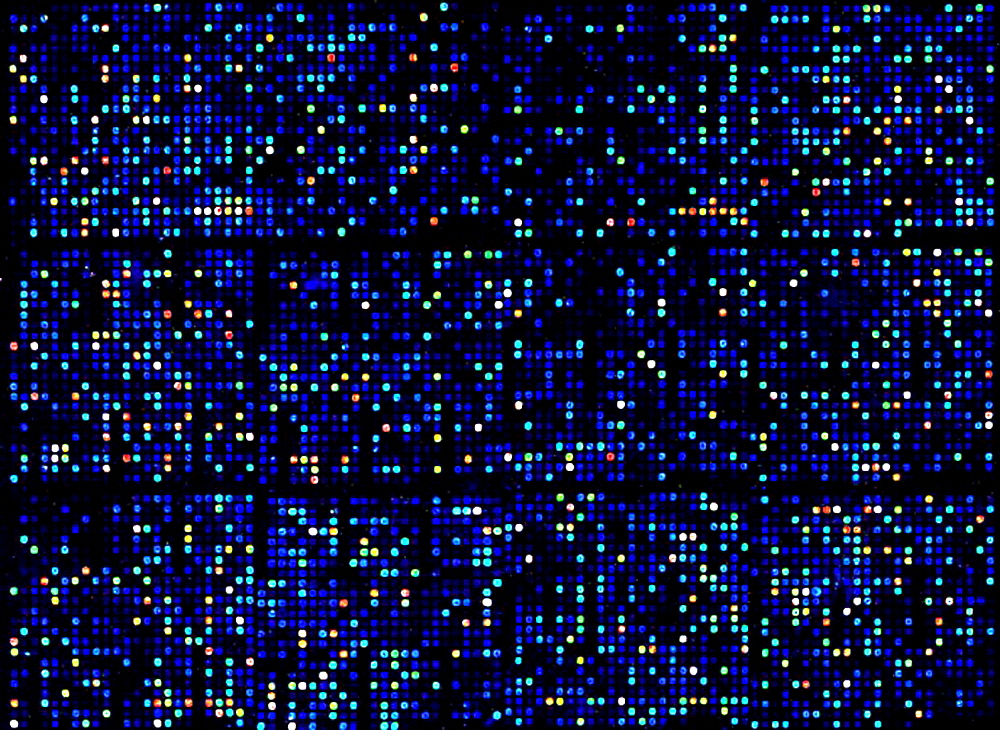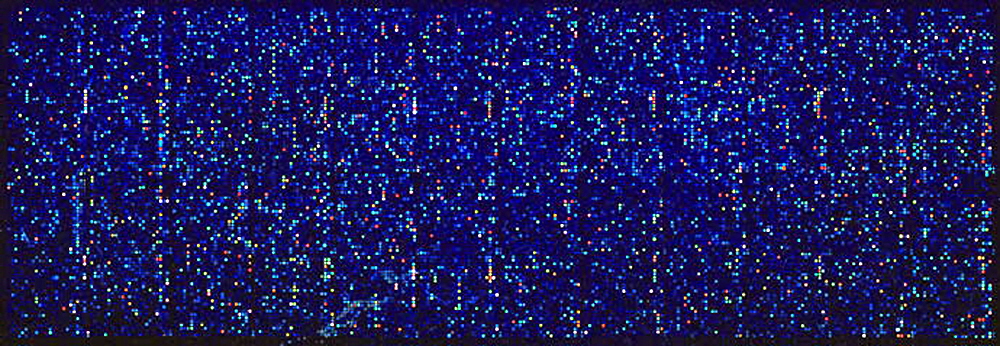Amino Allyl Labeling Kits
Data Sheet
![]() Shop this product in our online store
Shop this product in our online store
Arrayit | Alkaline phosphatase kits APK colorometric microarrays life sciences research
Reagents - Microarray Labeling - Amino Allyl Labeling Kits For DNA Microarray Applications in Research, Life Sciences, Molecular and Pharmaceuticals

Arrayit offers the market’s most robust, comprehensive and complete kits available for amino-allyl cDNA labeling from unamplified or amplified mRNA. Amino Allyl Labeling Kits are optimized for 1-2 µg of mRNA, and highly recommended for use with our H25K Whole Human Genome Chip and focused microarrays. Probe mixtures of cDNAs labeled indirectly using the amino-allyl procedure produce more intense microarray signals and lower background than other labeling procedures. Shown here is a scanned image of H25K hybridized with with 2.0 µg of Cy3-labeled cDNA probe derived from total human mRNA and labeled using the Amino Allyl Labeling Kit (Cat. AFK). The intense signal strength and ultra-low background allow users to detect and quantify rare mRNAs not detectable on other platforms, enabling the deciphering of major disease states including Parkinson’s and Alzheimer’s Disease.
Table of Contents
- Introduction
- Quality Control
- Product Advantages
- Kit Contents
- Technical Assistance
- Short Protocol
- Complete Protocols
- Recommended adn Required Equipment and Reagents
- Ordering Information
- Storage Conditions
- Warranty
Introduction
Congratulations on taking a big step towards improving the economies of scale, quality and speed of your genomics research. This booklet contains a complete set of protocols outlining the steps and principles needed to use Arrayit Amino Allyl Fluorescent Labeling Kit.
Quality Control
Arrayit assures the performance of this product. The finest scientific research was used to develop this product. Rigorous quality control monitoring of every lot guarantees that these kits conform to the highest industry standards.
Product Advantages
- Highly recommended for H25K Whole Human Genome Microarrays
- Supports all substrate and slide surface chemistries
- Easy protocol, high yields and efficient incorporation
- Can be used with both two- and three-dimensional surfaces
- Superior separation chemistry provides 99+% probe purity
- Dye removal reduces background in microarray hybridizations
- No alcohol precipitations required
- Kits arrive ready to use, no buffer or column preparation required
- Microcentrifuge format allows rapid purification with single columns
Important Note: Spin all sample kit tubes briefly by centrifugation prior to use to ensure proper sample volume.
Kit Contents (20 Labeling Reactions)
Item |
Packaging |
Storage |
Random Primer |
44 µl in 2 ml tube |
-20°C Freezer |
dTVN Primer |
22 µl in 2 ml tube |
-20°C Freezer |
Labeling Enzyme Mix |
33 µl in 2 ml tube |
-20°C Freezer |
Labeling Reaction Buffer |
50 µl in 2 ml tube |
-20°C Freezer |
AA-dNTP Mix |
90 µl in 2 ml tube |
-20°C Freezer |
DTT |
50 µl in 2 ml tube |
-20°C Freezer |
cDNA Synthesis Stop Solution |
250 µl in 2 ml tube |
-20°C Freezer |
Neutralization Solution |
250 µl in 2 ml tube |
-20°C Freezer |
Dye Binding Buffer |
500 µl in 2 ml tube |
-20°C Freezer |
Dye Binding Stop Solution |
60 µl in 2 ml tube |
-20°C Freezer |
Nuclease Free Water |
1.5 ml in 2 ml tube |
-20°C Freezer |
Fluorescent Probe Purification Kit |
20 reactions per kit |
Room temperature |
Technical Assistance
Please contact us if you have any comments, suggestions, or if you need technical assistance. By electronic mail: arrayit@arrayit.com (under the subject heading please type ArrayIt technical assistance). By email: arrayit@arrayit.com, Monday—Friday PST 9:00 am - 4:30 pm. Please remember that we want to hear about your successes!

Figure 1. Scanned single color image of the entire H25K microarray using 2.0 µg of Cy3-labeled cDNA probe derived from total human mRNA labeled using the Amino Allyl Labeling Kit (Cat. AFK). Notice the uniformity of the background obtained with probes derived from AFK.
Short Protocol (Steps 1-5)
This kit is optimized for 1-2 µg of mRNA as starting material and will generate 0.2-0.5 µg labeled cDNA per reaction. The process includes the following steps:
1. cDNA Synthesis from mRNA.
2. Hydrolysis of RNA.
3. Purification of amino allyl labeled cDNA.
4. Dye coupling to amino allyl labeled cDNA.
5. Purification of dye labeled cDNA.
Complete Protocol (Steps 1-5)
1. cDNA Synthesis from mRNA. To a PCR tube on ice add 1-2 µg of mRNA or 2-10 µg of amplified RNA, 1.0 µl of Random Primer, 1.0 µl of dTVN Primer, and nuclease free water to 10.5 µl total volume. Incubate at 80°C for 5 min and allow cooling at room temperature (20-25°C) for 10 min. Briefly spin to collect all the liquid and add 1.5 µl Labeling Enzyme Mix, 2.0 µl Labeling Reaction Buffer, 4.0 µl AA-dNTP mix, and 2.0 µl DTT. Incubate at 42°C for 90 min. Briefly spin to collect all the liquid. Add 10 µl of cDNA Synthesis Stop Solution to the mixture and store at -20°C.
2. Hydrolysis of RNA. Incubate the cDNA synthesis reaction at 65°C for 30 min. Add 10 µl of Neutralization Solution to the mixture and mix well.
3. Purification of Aminoallyl Labeled cDNA. To each 40 µl amino allyl-labeled cDNA sample, add 120 µl of FPP Binding Buffer. Mix thoroughly by vortexing. Transfer the 160 µl sample to an FPP Spin Column. Make sure the Spin Column is seated properly in the 1.5 ml Wash Microfuge Tube. Spin the assembly for 10 sec at 1,000 rpm in a microfuge. Discard the flow-through from Wash Microfuge Tube. Add 125 µl FPP Wash Buffer to the Spin Column and spin for 10 sec at 1,000 rpm in a microfuge. Discard the eluent. Wash two more times with 125 µl of FPP Wash Buffer. Centrifuge the Spin Column 60 sec in a microfuge to dry completely. Transfer the Spin Column into a sterile Elution Microfuge Tube. Add 50 µl of sterile dH20 to the Spin Column and incubate at room temperature for 5 min. Centrifuge the Spin Column for 10 sec at 1,000 rpm to elute the cDNA sample into the Elution Microfuge Tube. Add another 50 µl of sterile dH20 to the Spin Column and spin 60 sec at 10,000 rpm to elute any remaining cDNA. Dry the 100 µl cDNA sample in a SpeedVac for 30 min at 42°C. Store the purified cDNA pellet vacuum-sealed at –80°C until the dye coupling step. Store the purified cDNA pellet vacuum-sealed at –80°C until the dye coupling step.
4. Dye coupling with Aminoallyl Labeled cDNA. Obtain the dry cDNA samples from -80°C. Add 2.5 µl of Nuclease Free Water to each cDNA sample. Dissolve the Arrayit Green Cy3 or Arrayit Red Cy5 mono-reactive dye in 45 µl DMSO and mix by vortexing. To each 2.5 µl cDNA sample, add 4.5 µl of Dye Binding Buffer. To each 7.0 µl sample, add 3 µl of mono-reactive Cy3 or Cy5 dye for a final reaction volume of 10.0 µl. Incubate the 10 µl samples at room temperature (20-25°C) for 60 min. Quench each 10 µl sample by adding 6 µl of Dye Binding Stop Solution. Mix well. Incubate at room temperature (20-25°C) for 15 min.
5. Purification of Dye Labeled cDNA. Mix both the Cy3 and Cy5 reactions in a single tube. To each 16 µl dye -coupled cDNA sample, add 50 µl of FPP Binding Buffer. Mix thoroughly by vortexing. Transfer the 66 µl sample to an FPP Spin Column. Make sure the Spin Column is seated properly in the 1.5 ml Wash Microfuge Tube. Spin the assembly for 10 sec at 1,000 rpm in a microfuge. Discard the flow-through from Wash Microfuge Tube. Add 125 µl FPP Wash Buffer to the Spin Column and spin for 10 sec at 1,000 rpm in a microfuge. Discard the eluent. Wash two more times with 125 µl of FPP Wash Buffer. Centrifuge the Spin Column 60 sec in a microfuge to dry completely. Transfer the Spin Column into a sterile Elution Microfuge Tube. Add 50 µl of sterile dH20 to the Spin Column and incubate at room temperature for 5 min. Centrifuge the Spin Column for 10 sec at 1,000 rpm to elute the Cy3-coupled cDNA sample into the Elution Microfuge Tube. Add another 50 µl of sterile dH20 to the Spin Column and spin 60 sec at 10,000 rpm to elute any remaining Cy3-coupled cDNA. Dry the 100 µl Cy3-coupled cDNA sample in a SpeedVac for 30 min at 42°C. Store the purified Cy3-coupled cDNA pellet vacuum-sealed at –80°C until the hybridization step. Quantify the cDNA and efficiency of labeling with a low volulme spectrophotometer. Maintain at 4°C in the dark until the hybridization step. Alternatively dry the 20 µl cDNA samples in a SpeedVac for 30 min at 42°C and store the purified cDNA pellet vacuum-sealed at -80°C.
Required Equipment and Reagents Not Supplied
- Ice for incubation
- Arrayit Green (cyanine 3) and Red (cyanine 5) mono-reactive dye packs
- PCR tubes
- Thermal cycler
- Microfuge capable of 1,000 rpm or more
- Micropipettors
- Vortex mixer
- Vacuum concentrator
- Low volume Spectrophotometer
Recommended Products

